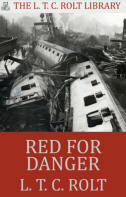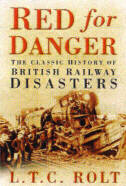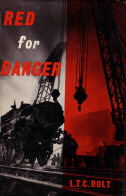Red for Danger
-
Re-issued as an e-book in 2020
Re-issued by The History Press in January 2010
Re-issued by Sutton Publishing in 1998
Second edition 1966
Originally published by John Lane in 1955
This classic history of British railway disasters covers every major incident on a British railway up to the mid-1950s. The cover of the 1966 edition lists some of the disasters Rolt wrote about in Red for Danger:
"The fate of the Flying Scotsman in a blizzard at Abbots Ripton and the frantic but fruitless efforts of the railway staff to avert a second catastrophe; the sequence of trivial but fateful mistakes which ended in the terrible head-on collisions at Norwich and Abermule; the disasters in the high Pennines at Hawes Junction and Ais Gill; the structural defects of the first Tay Bridge which led to its fall one wild December night in 1879; the packed runaway coaches of the Warren Point excursion rushing headlong down the Armagh incline; these are only a few of the dramatic and tragic events described in Red for Danger."
The stories are not all tragedy, according to the 1966 cover. There is a comic element in some of the mishaps which Rolt relates, while the episode of the runaway locomotive on the Somerset & Dorset line is sheer knockabout farce.
"Because they have been based on official records and the evidence given by eyewitnesses, these stories from the railway past are brought most vividly to life ... Mr Rolt reveals the painstaking thoroughness with which railway accidents are investigated - often fascinating pieces of real-life detective work - so that the cause may be established and guarded against in the future."Red For Danger is remarkable in its concise presentation of the important changes in railway safety working practices brought about through the detailed analysis of each accident.
Cover of the 1966 edition of Red for Danger
E-edition of Red for Danger, 2020
Red for Danger has been recently re-issued as an e-book, with a a new forward by the transport writer/historian Christian Wolmar:"This is a very humane book on a subject about which Rolt felt very deeply and his aim was to help future generations understand the roots of disaster. Indeed, Rolt’s sympathetic approach is beautifully illustrated in the introduction where he explains why he has confined his account largely to the period between 1840 and 1940, 15 years before his book was published. He explains he felt it was ‘inappropriate’ to deal with more recent incidents and although he did briefly cover some of them, in order not to create distress ‘I have considered it desirable to change or to withhold the names of the men chiefly concerned’. He was obviously not cut out to be one of today’s tabloid journalists!"The Kindle edition can be downloaded from Amazon.
From Christian Wolmar's forward to Red for Danger


